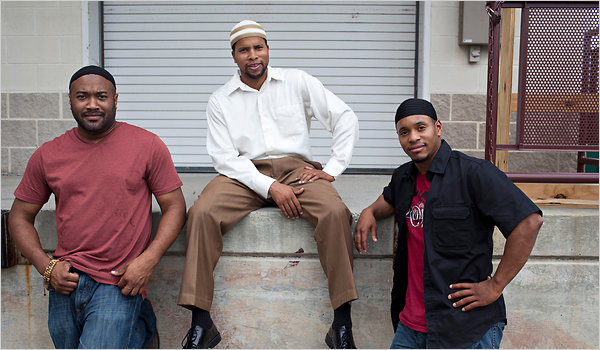
From left, Naeem Muhammad, Joshua Salaam and Abdul-Malik Ahmad form the Islamic hip-hop group Native Deen.

WASHINGTON — In 2005, when the State Department invited Native Deen, one of the most prominent Islamic hip-hop groups in America, to do a good-will tour of Mali, Senegal and Nigeria, the band’s members did not know what to do.
“We had a debate in the community,” said Abdul-Malik Ahmad, one of the three members of Native Deen. “ ‘Should we do it?’ ‘Should we not do it?’ Some people were saying, ‘Y’all are going to be puppets, going over there saying: ‘Everything’s O.K. We’re bombing your country, but we have Muslims, too!’ ”
The United States was not bombing those countries, of course, but the band was aware of the animosity in the Muslim world toward the American government. So Mr. Ahmad, now 35, and his collaborators — Naeem Muhammad, also 35, and Joshua Salaam, 37, who all live outside Washington — convened a shura, or community consultation. They asked for help to determine the proper course of action.
“We invited people of knowledge,” Mr. Ahmad said when we met Tuesday afternoon in a Georgetown bakery. “And we decided not to take every offer, but if it’s our mission to spread tolerance and faith, it can be O.K. to take this offer.”
Since that time, the trio of rappers and musicians — who use only percussion, because some Muslims believe other instrumentation is un-Islamic — has also traveled with the State Department to Egypt, Tanzania, Jordan and Palestinian territories. On July 1, Native Deen (“deen” is an Arabic word meaning religious system, or way of life) released its third album, “The Remedy,” featuring songs like “Only Fear Allah” and “Ramadan Is Here.”
The band performs about 40 shows a year, mostly at Muslim cultural conventions and summer camps. In the last 10 years, they have sold about 40,000 CDs, although, Mr. Ahmad noted, “usually our CD is bootlegged cause there is poor distribution channels for Islamic music.”
Mr. Ahmad and Mr. Muhammad grew up as African-American Muslims in an area of Maryland with few Muslims of any kind. Mr. Ahmad said his parents had joined the Nation of Islam as young adults, but had become orthodox Sunni Muslims and raised him to be religiously observant.
“My parents tried to instill in me that you pray five times a day, make sure you fast, basically all the beliefs of Islam,” Mr. Ahmad said. “But as a youth, it’s very difficult when no one else around you is doing that, and there’s the peer pressure not to pray, just to fit in.”
Through his local mosque, he got involved in Muslim Youth of North America, known as MYNA, an experience that he said “was amazing.”
“Other youth!” Mr. Ahmad remembers feeling. “Same faith!”
Mr. Ahmad was 15 when he met Mr. Muhammad at a MYNA camp in Rockville, Md. Soon after, at a MYNA summer camp in Ohio, he met Mr. Salaam, and in 1992 they contributed songs to a cassette compilation called “MYNA Raps.” Over the next decade, the three young men contributed to four subsequent “MYNA Raps” compilations.
“It was something my parents approved of, and it was hip, it was fun, it was uniquely American,” Mr. Ahmad said. “Even though the quality was poor, it was amazing.”
After the last “MYNA Raps” compilation, in 2000, the rappers decided to form Native Deen. The band has never provided its members, who are all married and have children, a full-time living, so they have day jobs. Mr. Ahmad is a Web developer whose clients include NASA; Mr. Salaam is the youth director for a Virginia mosque; Mr. Muhammad works for a relief agency.
Some more famous Muslim rappers, like Mos Def and Lupe Fiasco, are open about their religion but do not make it a main focus of their art. Native Deen, by contrast, writes conspicuously Muslim lyrics. As a result, said Mr. Salaam, who joined us late at the bakery, the group’s music is particularly popular among youth from observant families.
“We tend to deal with the masjid-going community,” Mr. Salaam said, using the Arabic word for mosque. “But the majority of the community is not masjid-going. They may come to the masjid once a week, once a year. But the people we have been primarily dealing with — this masjid invited us, or this Islamic community center, or this relief organization.”
At Native Deen shows, audience members are more likely to be from Middle Eastern or South Asian backgrounds than to be American blacks. One reason, according to Suad Abdul Khabeer, a Purdue University anthropologist who studies Islamic hip-hop, is that Native Deen’s “harmonies and melodies sound like the kind of nasheed” — Muslim praise music — “you get from the Middle East.”
As a result, Dr. Abdul Khabeer said, Muslim immigrants who may look down on African-American culture find Native Deen’s work palatable, while American blacks may find it insufficiently aggressive, sonically speaking. “Hip-hop lite doesn’t speak to them in the same way,” Dr. Abdul Khabeer said. “Black audiences are like, ‘That’s kind of lite.’ ”
But Native Deen’s faith places it in the history of American hip-hop more generally. Pioneering hip-hop artists like Afrika Bambaataa and Wu-Tang Clan have demonstrated in their lyrics the pervasive influence of Islam in black America. Even when rappers are not themselves Muslim, Dr. Abdul Khabeer said, many borrow ideas and terminology from orthodox Islam and from Muslim-identified groups, like the Nation of Islam and the Five-Percent Nation.
“We never saw ourselves as this, because we have just been doing it, but people see us as pioneers in Muslim music,” Mr. Salaam said. “For the ‘MYNA Raps’ people, that is going back 20 years.”
“Later on,” he added, “I think it will be written that a lot of American Muslim experience, Native Deen were part of that.”



